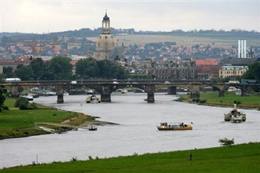
German press: The exclusion of Dresden is both justified and unjust
 |
"For Saxony and its Florence on the Elbe, this expulsion, however regrettable from a nationwide perspective, is a logical consequence of boundless self-love,” wrote FAZ. It claims that the Saxon metropolis, which owes its recovery to financial aid from both home and abroad, has gradually become a "spoiled, self-absorbed, and complacent city that believed it was entitled to absolute autonomy." According to the Frankfurt newspaper, the removal from the list represents a painful, yet possibly educational awakening for Dresden.
However, the respected newspaper also expresses suspicion that "UNESCO acts vigorously only where it can afford to." It labeled Thursday's decision a "shameful victory." FAZ points to other examples where local authorities do not adequately care for protected sites. "Only when it acts as energetically in the case of Pompeii or Beijing, Angkor Wat or Babylon as it did in Saxony, will it prove itself as a true protector of world heritage,” the FAZ reproached the global organization.
Berlin's Tagesspiegel described UNESCO's decision at the meeting in Seville as a "healing shock." The commentator acknowledges that the world organization could not decide otherwise, as it would otherwise lose face. Nevertheless, it only makes sense if stricter criteria are established. "Recently, UNESCO has been handing out the honorary title quite liberally. But when anything can be deemed cultural heritage, and one trips over it, it becomes absurd," criticizes Tagesspiegel's policy towards UNESCO.
The newspaper Die Welt reassures that Dresden will "shine" even without the UNESCO title. The paper points out the significance of Dresden "burdened by history" for the Germans, illustrating this by noting that any interference with the city's silhouette immediately provokes nervous and passionate defensive reactions. "Brilliant" restoration of the local Church of Our Lady is "a rare example of what passionately expressed public opinion can achieve." Die Welt concludes that Germany has a highly developed sense of protecting monuments and natural beauties.
The English translation is powered by AI tool. Switch to Czech to view the original text source.
0 comments
add comment
Related articles
0
26.08.2013 | Dresden opened the bridge for which they lost their UNESCO listing
0
25.06.2009 | UNESCO removed Dresden from the World Heritage List
0
04.07.2008 | DPA: The Saxon Dresden is unlikely to comply with UNESCO's ultimatum
1
04.07.2008 | Dresden has not yet been removed from UNESCO's list
0
24.03.2007 | Dresden will attempt to prevent the construction of the controversial bridge












